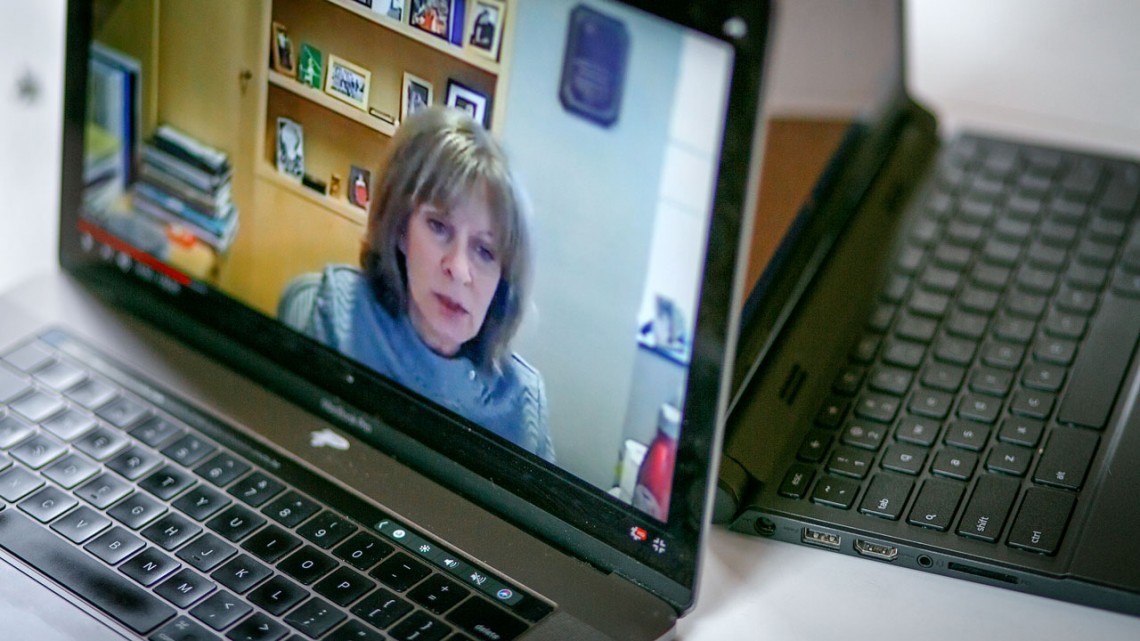
Mary Opperman makes a web address to staff to answer questions regarding Cornell’s response to COVID-19 pandemic.
Opperman responds to employees’ COVID-19 questions
By James Dean
During a virtual forum March 18, Mary Opperman, vice president and chief human resources officer, thanked university staff for their flexibility and resilience during a time of extraordinary change and uncertainty.
“I have seen heroes across this campus who have gone above and beyond to support each other, to support our students,” she said. “I feel a sense of pride in how hard everyone is trying to do what is best for everyone, recognizing how many different priorities there are.”
Opperman took questions from the Employee Assembly through the video meeting platform Zoom. Reflecting some of the early challenges encountered as most faculty, students and staff rapidly shift to remote operations and virtual instruction in response to the COVID-19 pandemic, the meeting capacity was unintentionally limited to 300.
“This is somewhat of an unprecedented situation, and we’re all working through it the best we can,” Employee Assembly Chair Adam Howell said in opening the forum. “There’s a good amount of anxiety, and likely many questions.”
One significant concern is how the crisis will impact dining and other workers whose services are being scaled back by both government orders and the departure of thousands of students that Cornell has directed to return home, heeding health officials’ recommendations to de-densify campus and promote social distancing.
“We’re working very hard to try to find meaningful opportunities to continue to perform services that we need done at a time when a lot of things are slowing down,” Opperman said. “We have such a sense of obligation to [those workers] that we’re doing the best we can to try to keep them in a job that needs to get done.”
If opportunities arise for employees to shift job assignments in response to new needs, they will be posted on Workday’s Talent Marketplace, she said. Details on that process are being finalized.
Some employees continuing to perform duties on campus have expressed safety concerns.
Following health agencies’ guidance for ensuring low-risk environments, Opperman said, all employees have been asked to practice social distancing and frequent hand-washing.
Among other precautions taken, during student move-outs, parents have been asked not to enter rooms but to wait outside as employees and volunteers bring items to them. The moves have unfolded smoothly so far, meeting participants said.
Employees worried about their work environment should speak to their supervisor or HR representative, Opperman said, or to her directly, to talk through the underlying issues and, if necessary, make alternative arrangements without fear of retaliation. They should consult Cornell’s COVID-19 website and HR’s COVID-19 Workplace Guidance website for answers to questions around which misinformation may be swirling.
Opperman praised colleagues at Weill Cornell Medicine and Cornell Tech who are facing more extreme challenges in New York City, as well as the outpouring of support in Ithaca.
“It’s very difficult to deal with something that’s so unknown and also be trying to figure out how to make all these changes happen,” Opperman said. “I just really appreciate how dedicated everyone is and how much concern you are all showing for each other, and I ask you to continue that and also to please, please take care of yourselves.”
The university has added 10 Health and Personal (HAP) days for eligible employees who are not currently at their maximum that can be used to care for oneself or a loved one.
By March 20, every college and division will have developed plans for shifting staff to remote work where possible and providing appropriate support for work continuing on or off campus. The Division of Human Resources plans to post short videos each week offering tips on how to manage working from home and self-care, a process Opperman kicked off with her March 18 address. (Suggested video topics can be submitted via email.)
But on a nearly daily basis, every plan has had to react to fast-changing global events that continue to make many questions difficult to answer, Opperman said.
“What we knew and understood yesterday may have changed today,” she said. “We’ve been focused on the issues right in front of us.”
In addition to social distancing and hand-washing, Opperman encouraged staff to pause from time to time to reach out to friends, family and colleagues, and to breathe deeply, eat properly and take walks outside to help cope with a situation that is more marathon than sprint.
“We have no answers for how long this is going to go on,” Opperman said. “What we are doing is learning as much as we can and responding as best we can to a changing situation. But we are committed to getting through this, and getting through this together.”
Media Contact
Get Cornell news delivered right to your inbox.
Subscribe
